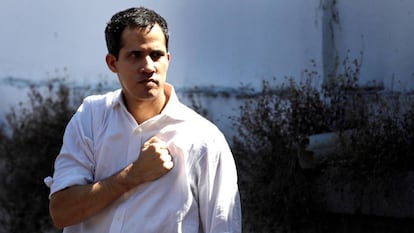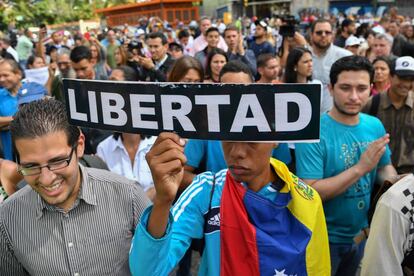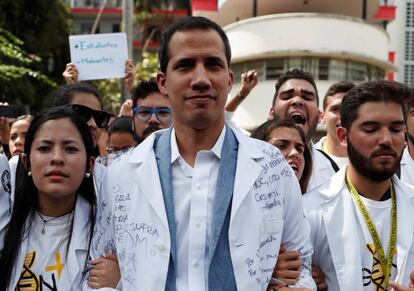Juan Guaidó: “There is no risk of a civil war in Venezuela, 90% of the people want change”
The president of the National Assembly talks to EL PAÍS about why Nicolás Maduro must leave office and whether a military intervention is on the cards

Last week, Juan Guaidó (La Guaira, Venezuela, 1983) declared himself the interim president of Venezuela at a mass demonstration against President Nicolás Maduro. He was immediately recognized by the administration of US President Donald Trump, and more than 60 countries have since thrown their support behind the 35-year-old.
Guaidó’s declaration has set in motion a process aimed at removing Maduro from power, establishing a transitional government and calling free elections. The Venezuelan National Assembly, which is headed by Guaidó, met on Tuesday to plan the legal framework for this stage.
The only ones who speak of violence and commit it are Maduro and his regime
As street protests look to step up the pressure against Maduro’s government, Guaidó took time from his busy schedule to talk to EL PAÍS about how he plans to rescue Venezuela from the current political crisis.
Question. The European Union has given Maduro eight days to call new elections or they will recognize you as Venezuela’s legitimate leader. What do you expect from the EU now that the deadline has almost passed?
Answer. First, I want to thank the European Union, the 28 countries, for reaching a consensus.The recognition first of our parliament, then our Constitution and Venezuela’s democratic struggle is important, as is the non-recognition of Maduro and the electoral farce that he tried to stage. I believe that this is a strong position and in the coming days the ultimatum deadline will arrive, which is the foundation of other important actions for us as Venezuelans.

Q. Some sectors have expressed fear that the situation will lead to conflict, a bloodbath.
A. There is no risk of civil war in Venezuela, as some have tried to make out. Why? Because 90% of the people want change. There is a small leadership and military support for the regime that is made up of armed paramilitaries – which we call collectives – from elements that are not going to have any kind of resonance. Is there a risk of violence? Today there is. They have killed dozens of students in a week. More than 140 in 2017. Caracas is the most violent city in the world if you look at the homicide rate per 100,000 people. Most of the country wants change… The only ones who speak of violence and commit it, through the FAES [special police force] and paramilitaries no less, are Maduro and his regime. Those who fuel a thesis like this are fueling the violence.
Q. You rejected the last presidential elections in Venezuela. Explain why you believe you should be considered acting president?
A. Legitimacy comes from the popular vote. Given there were no presidential elections in 2018, Maduro’s term expired on January 10, 2019. That’s why we find ourselves before a presidential vacuum, which should be occupied by the president of the National Assembly, according to Article 233 of the Constitution. Maduro insists on usurping power and leaving all Venezuelans who need to eat, who need basic food and medicine, in very precarious conditions.
We are not looking to twist hands, we are looking to reach out with our hands
So constitutionally, I am the acting president of Venezuela and my mandate is very clear – it is outlined in Article 233: hold free elections in the least amount of time possible. To do this, we have set three phases: an end to the usurpation of power, because we are in a dictatorship, a transitional government that stabilizes the country and addresses the humanitarian crisis, taking the necessary steps to reinstate institutionalism in the country, and the other element is the National Electoral Council, to hold free elections.
Q. But could this process turn into an ongoing conflict, dragging on for months and descending into a situation where nobody wins? How do you plan to launch this transition?
A. We have to bring together our capacity to stop the usurpation, to mobilize the people, to see how the international community recognizes us. Some make it seem like it’s just the United States, but now there are more than 60 countries, almost 65, not just Europe and America, that have recognized me. How will this happen? We have made a clear call to the armed forces. Maduro is holding the weapons of the Republic hostage, with 27 sergeants tortured in the basement of the Military Counterintelligence Office (DGCIM) to generate fear and persecution. It’s said that Cuban intelligence agents are behind the torture. We see children being kidnapped in Venezuela, the murders committed by Venezuela’s Special Police Force (FAES). It is a question of social control, of spreading fear and terror.
Q. Is a military intervention off the table?
A. This is an issue that has come from the United States. It’s true, for example, that we have requested asset protection, humanitarian aid. When the European Parliament makes its announcement this Thursday, we are going to formally ask Europe not just for Venezuelan assets to be protected but also for humanitarian aid and resources for projects.

Q. Why have you not been arrested by the government?
A. I have asked myself the same thing, especially because I have friends in jail, friends in exile, friends who are dead. I was kidnapped twice and I think this is the time for solutions, to pull together society’s forces. It’s not about Juan Guaidó. He is the personification of a moment, of the popular support, of the desire to change Venezuela, a country that wants to grow.
Q. But how do you believe Maduro will resist this change?
A. Maduro is a dictator. He is not going to wake up with an epiphany. He destroyed the country. Inflation is at 2,000,000%, every day patients die from lack of supplies. We have to pressure him, socially, internationally. […] I don’t think those close to Maduro and in the upper echelon of his government want to go down knowing that their model failed.
Maduro destroyed the country. Every day patients die from a lack of supplies. We have to pressure him, socially, internationally
Q. Would you be willing to offer Maduro an exit, a political agreement?
A. For 20 years we have suffered a lot as a society. We have seen death, forced displacements, migration. We have seen imprisonment but today we are seeing hunger, the need for medicine and desire for change. If we do a balance of these elements, we are willing to speak with anyone who will talk as long as it is about ending the usurpation, the transitional government and free elections. We have put an amnesty law on the table, something some countries call transitional justice, a law for the transition that will allow all sectors to take part in the process.
Q. And what will be the political framework of the transition? Your principles of inclusion?
A. Openness and governance […] We are not looking to twist hands, we are looking to reach out our hands. It’s about achieving governability, stability and addressing the needs of our people.
Q. Once more, what do you think about speculation that there will be a military intervention?
A. Venezuela is a sovereign country, determined to win its freedom. I don’t think it’s necessary to reach a stage like that. We are going to put up as must pressure as possible with the lowest social cost, and above all, stand up to rescue governance, public services and economic stability.
English version by Melissa Kitson.
Tu suscripción se está usando en otro dispositivo
¿Quieres añadir otro usuario a tu suscripción?
Si continúas leyendo en este dispositivo, no se podrá leer en el otro.
FlechaTu suscripción se está usando en otro dispositivo y solo puedes acceder a EL PAÍS desde un dispositivo a la vez.
Si quieres compartir tu cuenta, cambia tu suscripción a la modalidad Premium, así podrás añadir otro usuario. Cada uno accederá con su propia cuenta de email, lo que os permitirá personalizar vuestra experiencia en EL PAÍS.
¿Tienes una suscripción de empresa? Accede aquí para contratar más cuentas.
En el caso de no saber quién está usando tu cuenta, te recomendamos cambiar tu contraseña aquí.
Si decides continuar compartiendo tu cuenta, este mensaje se mostrará en tu dispositivo y en el de la otra persona que está usando tu cuenta de forma indefinida, afectando a tu experiencia de lectura. Puedes consultar aquí los términos y condiciones de la suscripción digital.








































